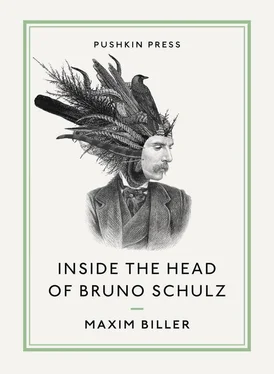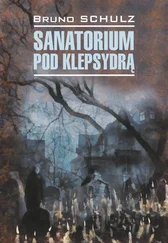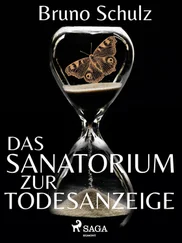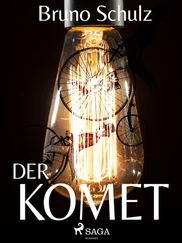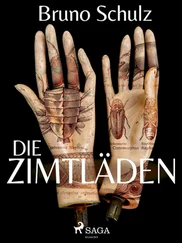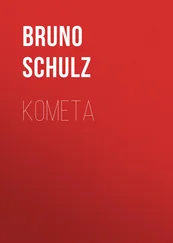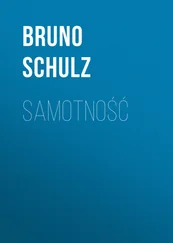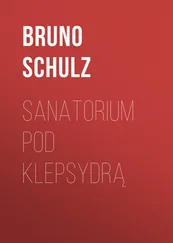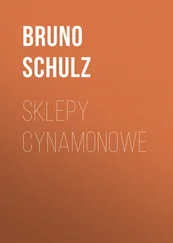Maybe the ending goes a little too far, thought Bruno, as he read the last pages of his letter to his famous and influential colleague in Zürich. Will he believe it of me? Will he give me his support? Won’t he think I mean him? And suddenly his companion Fear was back, Fear who had left him for the last couple of hours, and the hot gray lump was turning in his belly again. At the same time Hania’s loud footsteps shook the black and now almost invisible basement ceiling from above, and he was afraid that she might at any moment break through the floor of the kitchen with her high stiletto heels and pierce his head. Hania — poor, intolerable Hania — had recently taken to wearing her expensive French shoes even at home, as well as her chiffon dress from Lunarski & Klein in Warsaw, for she was expecting the late Jankel back anytime soon, and wanted to be beautiful for him. And as she almost never took off the dress, not even when she was cooking, and certainly not now, it was covered with splashes of red borscht and dried yellow bits of dough, and its lovely white puff sleeves had dozens of holes burnt in them. Hania was not the only bundle of nerves in the house. Her two sons were also getting more and more restless from week to week, and were in a bad way. Their trousers and shirts were torn, they had dark red, almost black scabs on their bare knees, they cut each other’s unwashed hair with the kitchen scissors, so that it looked untidy and all tousled as if they were vagrants, and Bruno hadn’t seen them in school for months. When their mother asked them something, they either didn’t reply at all, or threatened to throw her out of the house, so she generally kept quiet in their presence. However, Jacek and Chaimele left their uncle in peace. Only sometimes, when he was lying on Papa’s old, greasy, Biedermeier sofa with its huge vultures’ feet and claws and, quietly moving his lips, read a book or drew a sketch, did they talk about him in whispers. “Who’s going to look after us when the Russians or the Germans come?” Jacek said to Chaimele a few days ago. And Chaimele replied, giggling, “Uncle Bruno, of course. Along with the tarts from Stryj Street and his writer friends in Warsaw, he’s sure to know what to do.” Whereupon Bruno uttered a quiet whistle of alarm, gave the sofa a little pat, and it immediately pattered out of the living room with him and into the library, where he could be undisturbed again.
By now it was so dark in Bruno’s basement study that he could hardly read his own handwriting. The faint, orange, fantastic light of the street lamps that had just come on outside in Florianska Street was lost halfway between the open skylight and his easel, where he had hung up his hat and coat for years, and sometimes he imagined hanging himself up on it. He quickly stood up, forced himself back behind the low desk and switched on the handsome, cold, German lamp, with its black metal shade that even after years shone like polished cavalry boots. Only when he was sitting on Papa’s creaking old office chair did it occur to him that he was no longer crouching on the floor, like one of the creatures from his daydreams that had no will of their own, scribbling violet lines, squiggles and little hooks, like an insect, in his notebook, marks that might even make some kind of sense in the end. But Fear was still there, and Fear whispered: you must come to the point. Do you know how many letters he gets every day? Yes, I do, replied Bruno, but do you really think I can write to him now and tell him what I really want him to do? Yes, why not, replied Fear, although I’m not perfectly sure, because I am Fear. Haven’t I overdone it? said Bruno. I mean saying that someone else is pretending to be him, could be him, but that he is so brutish and arrogant to the very people who respect him and sing his praises. I mean, it does sound rather unlikely, doesn’t it? Do you know the story of the people of Sichem, asked Fear, do you know what happened to them after they had chosen Abimelech as ruler of the Philistines? Not exactly, said Bruno, will you tell me? Later, maybe, said Fear, you’re not ready for it yet.
“The day before yesterday, dear Dr Mann,” Bruno went on writing quickly by the light of his German lamp, while he pressed the thumb and forefinger of his left hand to his temples, which were suddenly aching, “Dr Franck came to see me at the school. As you already know, he is the former specialist in internal medicine who no longer wants to submit to the laws of everyday life. Instead he sits at the railway station talking to himself, or he recites prayers and blessings out loud, all jumbled up — he of all people, the atheist and one of the first Zionists in our town. After knocking so quietly that you could hardly hear him, Dr Franck came into the art room and asked me to go out with him. At first the boys did not want to let me go — they never want to be left alone, you see, because then they always attack one another like enemies. When they began begging, tugging at my jacket with their beaks, Dr Franck — I had not seen him so clear and determined since he closed the practice — held his outstretched forefinger in front of his mouth and said a long, slow, ‘Ssh!’ At once they fell silent, and flew back to their places. Some of them went on drawing, some hid their heads under their wings and fell asleep.”
Bruno stopped massaging his temples and, with his notepad close to his face, went over and brushed aside a few tiny gray and white feathers that had sunk slowly from above onto the paper. Instead of sinking to the floor they flew up into the vortex that had risen and performed a little dance in front of his flat, paper-kite nose. Bruno watched them, smiling, and kept blowing them up in the air again, then he lowered his head and wrote: “No sooner had Dr Franck and I closed the classroom door behind us than he began talking to me excitedly. It was about your double, Dr Mann. Of course he had not left Drohobycz after his nocturnal performance in the hotel manager Hasenmass’s bathroom. He has never yet done what he said he would do. He explained that his wife had fallen sick in Zürich, and besides, he must wait for the rest of his library, which was stuck in Customs in a Reichsbahn railway car at the border near Basle, so he meant to make use of this extra time to stay in our town, working in peace before his great journey to America. Two days later he gave a reading in the pharmacy on the market place — he stood at the sales desk and, despite protests from the apothecary Hulciner, we had made ourselves comfortable in all the little drawers and compartments. Apparently he was reading the first pages of the continuation of his novel about the confidence trickster Felix Krull, but anyone can say that. It is true that what he read didn’t sound bad — Krull decides to go to the circus, gets to know a rich and beautiful Englishwoman whom he does not love, and so on — but the sentences were trite and pompous. This evening it was finally clear to me that he cannot be the real Thomas Mann, for one thing because he appeared in a blood-red Persian robe, loosely tied with a curtain cord that had been pulled down, with his bare chest showing and a small, wildly twitching snake between his legs. And now Dr Franck was standing in the hall of the Jagiełło High School in front of me, telling me firmly, but with quivering lips, what he had seen and heard a few hours earlier. That morning the alleged Thomas Mann — his hair, which was usually combed smoothly back, tousled, rouge on his cheeks, his thin mustache shaved off and then painted on again with shoe cream — had been sitting next to him in a niche in the station cafeteria, talking in German to someone whom Dr Franck did not know. This other man had a high, squeaky, pleasing voice”—here Bruno stopped writing, closed his eyes and thought of a German movie actor whose dishonest, superior manner, reminiscent of Wilhelm Busch’s naughty boys Max and Moritz, always drew comments in the form of loud whistles from the spectators in the Drohobycz Palace Cinema—“and had the amiable and familiar face of a neighbor to whom you would entrust the key to your own apartment before going away on a journey. They were conversing in such low voices that at first Dr Franck could not hear what it was all about. He caught the word ‘movement’ once or twice, and the name of the Soviet Foreign Minister Molotov was also mentioned. Then the alleged Thomas Mann, speaking in a rather louder and more agitated voice than his companion (who wore a long, black, gleaming leather coat that rustled as he moved, and that he had not removed in the cafeteria), began enumerating the surnames of the Jewish inhabitants of Drohobycz. They kept laughing — particularly at those names that also had a literal meaning in German, such as Gottesdiener (servant of God), Katzenellenbogen (cat’s elbow), Wahrhaftig (truthful), Hasenmass (hare’s measure) — and finally the other man said it was all so witty, he really couldn’t take any more of it, and he asked the false Thomas Mann to give him a written list of all the Jews in town instead, with their addresses and a brief assessment of their physical strength and financial circumstances. At some point”—and again little gray and white feathers fell from the air and settled on Bruno’s notepad, he felt a not unpleasant breath of wind pass over him, now hot and now cold, and heard the soft tripping of small birds’ feet coming closer from all sides—“at some point Dr Franck, who was finding the conversation of the two men increasingly sinister, closed his eyes, and he began reciting the Shacharit morning prayer for the eighth or tenth time that morning. But then his curiosity got the better of him, and he looked past the wooden partition between the tables in the cafeteria at the two Germans sitting there. Of course his eyes immediately met those of the man in the leather coat, who nodded to Dr Franck, without showing any surprise, pointed his forefinger at him like a commissioner on a Red Army poster and said, ‘I like your people’s prayers, and the Shema Israel is particularly fine. It would be a loss if there were no one left to recite it.’ Do you understand now, Dr Mann, why I am writing to you?”
Читать дальше
